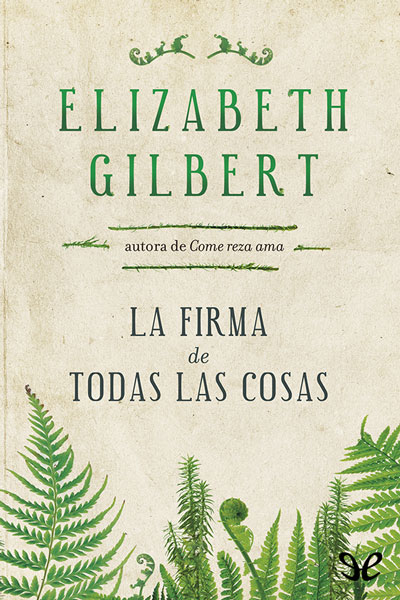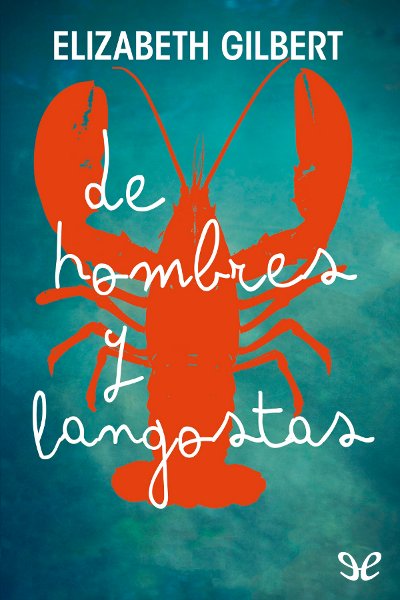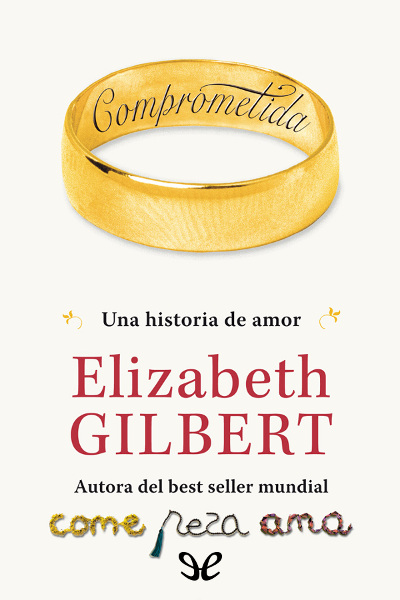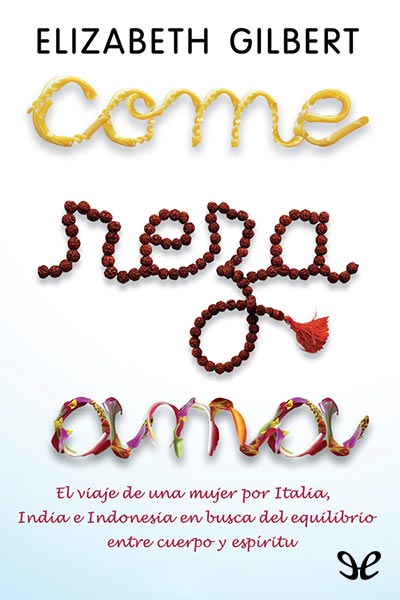oleebook.com
Menja, resa, estima de Elizabeth Gilbert
de Elizabeth Gilbert - Género: Didáctico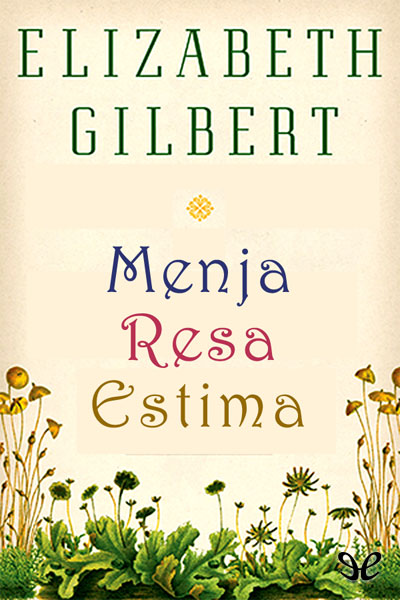
Sinopsis
Tots, en un moment o altre, hem sentit o sentirem la necessitat de prendre distància i replantejar-nos la vida per recuperar-ne el sentit. Un bon dia, Elizabeth Gilbert, després dun desengany amorós i un divorci traumàtic, va decidir començar de nou i emprendre un llarg viatge que la va dur successivament a Itàlia, lÍndia i Indonèsia, tres escales geogràfiques que es corresponen amb les etapes de la seva recerca interior. La novel·la autobiogràfica dElizabeth Gilbert mostra el que passa quan decidim agafar les regnes de la nostra vida. Menja, resa, estima proposa un viatge de revelació, equilibri i pau interior. Potser aquest llibre no ens canviarà la vida, però ens obrirà els ulls.
Libros Recomendados - Relacionados
Reseñas Varias sobre este libro
Wow, this book took me on a roller-coaster ride. I couldn't decide if I loved it or hated it and it seemed every few pages I'd go from thinking Gilbert was delightfully witty to thinking this was the most horribly self-absorbed person to ever set foot on the earth.
In the end the overall effect was rather sitting at a party listening to someone tell a long involved story all about themselves, and you're alternately annoyed and fascinated and you want to get up and leave but she's just so entertaining that you keep telling yourself you'll leave in the next minute--and so you end up sticking through the whole thing.
<----- WARNING: LOOONG REVIEW AHEAD :) ------->
I didn't hate Eat, Pray, Love, but it left me really unsatisfied. When I first started reading the book, I couldn't help rolling my eyes and thinking "Here we go, another tale of a precious, privileged woman who is unsatisfied with her life." I stuck with it though and was charmed through the Italy section by Gilbert's humor and down-to-earth writing style. Still, for a woman who abandons everything in search of a true spiritual experience, she leaves most of the important questions unanswered. I felt that Gilbert projects herself so strongly onto every place and every person she encounters that I'm not sure what she really learnt along the way.
As delightful as the Italy section was to read, I felt she never really stepped out of herself to understand the country on its own terms and to move beyond the stereotype. Despite it being a bit of a superficial assessment, I have no problem with Gilbert associating Italy with pleasure. There is enough beauty there to warrant it.It was more her interpretation of what it means to open oneself to pleasure that bothered me and seemed very narrow. For Gilbert this consisted mostly of overindulging in foods and allowing herself to put on weight. It seemed she came to Italy thinking she already knew how to experience pleasure and proceeded to enact it based on her definition (even though there are indications that the Italian interpretation of pleasure is not merely restricted to this.) I would have d to see her explore what it meant to devote herself to pleasure just as seriously and reverently as she seemed to take the meditative experiences in India.
Overall though, my biggest problem with this book was I had difficulty at times believing Gilbert achieved the enlightenment she talks about because she is so internally focused. Most importantly I still have not really grasped why it was necessary for her to travel to these 3 places.
I understand that her intention was not for this book to be a travelogue but it begs the question, "Why was it necessary to go to Italy, India and Indonesia if the purpose was to not to gain something from them that could not be found elsewhere?" In every country Gilbert created a little security blanket of expat friends who seemed to cushion her from really understanding the lessons the countries had to offer on their own terms. Why go to India to meet Richard the big Texan Guru, for example? Why not just go to Texas?
For those of us with "eyelids only half-caked with dirt" but who can't uproot our lives and travel to countries of our choosing is "enlightenment" still an option? I wanted Gilbert to talk more about how anyone with an ordinary life but who is searching for insight could still balance spiritual yearning with duty.
And that's my final peeve about this book. I wondered if Gilbert had any sense of duty or sense of obligation to anything beyond herself. Gilbert seems to recognize the bonds of duty that restrict the locals she encounters. Yet, she somehow paints them as pleasurable or inevitable yokes for the people who bear them. Her detached observations of life and death rituals in India and Indonesia as though they are restricted to those parts of the world made me want to shake her and say "but there are rituals everywhere; you have made a conscious decision to remove yourself from the ones you know."
I ask about duty not because I wanted Gilbert to stay in a loveless marriage but because the concept of duty is also linked to a concept of justice. What is it that we ought to do? What do we owe each other?
Part of me felt that Gilbert took comfort in the non-dual aspects of Eastern philisophies in a strange way. She seemed almost relieved that the non-duality of existence would ensure that one would not necessarily be punished by the universe for selfish deeds. I felt Gilbert embraced that aspect of the philosophy without realizing the equal importance those cultures place on the balancing notions of reciprocity, duty, of being social beings in the truest sense (often taking it to the other negative extreme).
The lack of sense of obligation to anyone other than herself made Gilbert seem curiously dead to the contradictions around her. She didn't seem perturbed at the abject poverty of the Indian women around her, or to question if it was just. She never wondered how a spiritual person should grapple with the injustice of the world, nor did she seem to question the "rightness" of living in the midst of poverty in an artificial environment created to specifically cater to pampered Westerners. In Indonesia, she finally seems to see beyond herself to the suffering of others but when she does try to help someone it seems impulsive and done almost with carelessness so that the whole thing almost becomes a big mess.
After all of this, the end of the book just seemed to fall flat as Gilbert tried to wrap things up quickly, crowning it all of course with a romance with a doting and exotic lover.
This book had a lot of potential but ultimately it seemed a story about one woman's sense of entitlement and her inability to ever quite move beyond that though she does make some valiant efforts to do so. 2008 non-fiction1,412 s2 comments MelissaS12 282 Read
WHY? I cringe to think why so many women want to feel that this was a true spiritual journey. It was a pre-paid journey. The woman starts off with telling us over and over about how painful her divorce was, however she dismisses how it ever came to be that way. Leaving her audience only to guess it was so horrible she had to leave and find herself.
When asked in an interview if dumping her husband and pushing off wasnt selfish, here is what Ms. Gilbert had to say:
"What is it about the American obsession with productivity and responsibility that makes it so difficult for us to allow ourselves a little time to solve the puzzle of our own lives, before it's too late?"
This statement alone tells so much. A responsibility towards a marriage and spouse is considered an unwanted "obsession" and one's own pursuit of happiness supercedes everything else? If a man decided to dump his wife and family to flee to the Himalayas to meditate we wouldnt be calling it a spiritual journey...we would call it irresponsibility.
India: This when she got just a little too proud of herself. I grew so tired of her boasting about how all her decisions led to a higher plan of consciousness and a new appreciation for life and a new understanding of the universe at large.
And Bali was even worse. I was hoping the little old guy didn't remember her. Didn't that whole episode just turn out a little too cutely? And then she fell off her bike! She met her doctor friend, and bought her a house. And met an old guy, and then she did things to herself! And then she slept with the old guy. And of course she's better at that than any of us because she is now enlightened. And then she made a little rhyming couplet of a life in Australia, America, Bali, and Brazil. Double cringe.
Italy: The author's angst and shallow self-discovery and pretend real people met with the express purpose of reflecting what she would to 'learn' (lessons that most of us will have learned far earlier in life before more interesting lessons presented themselves.)
To quote a phrase from the "Italy" section of this book, "cross the street" if you dare to even glance in a bookstore window and entertain a thought of buying this book. Elizabeth Gilbert has no ideas about life. Not only does she have nothing to teach, she has nothing to say. This book is so vicarious that it reveals a profound and deeply disturbing ignorance about the complexities of real life.
The author's observations about life are simplistic and her insights so embarrassingly undeveloped and unsophisticated that she comes across as a detached observer. There are very few passages in this book that reveal any real sense of transformation in her life. She never really seems to glean anything authentic or deeply affecting from any of her experiences. And because she has gained nothing, she has nothing to offer. The reader is frustrated and unable to connect with her on any level. This memoir not only lacks readability, it lacks any real humanity.
She is right when she says that she is not a traveler; she does not have the heart or spirit of a true traveler because she somehow remains deeply unaffected. She is merely a tourist, a spectator, barely scratching the surface of the lands she traverses, the people she encounters, and the experiences of what it means to be human. She fails to see the poverty that surrounds her, or maybe she sees it? She definitely never writes about it, maybe because it is not part of the road to any enlightenment.
In spite of her year long journey she is still unable to gain true insight or wisdom from her pain and struggles. There is no profoundness in her journey, whether it is personal or physical. This book is just a simple walk through a simple mind. She is not even a good enough writer to be able to cleverly disguise her child observations in beautifully crafted language. I would rather read the trail journals of a young backpacker any day. At least they are 'real.'
After reading the book, I wondered how it found its way to the bestseller list. I was perplexed by its popularity. So I did some research. As it turns out "Eat, Pray, Love" is an ideal industry example of how a publishing company can "create" a best seller from the printing of a trade paperback. In hard cover, this book only generated mediocre book sales in the year in was published. However, someone at Penguin adopted it as a "darling" and created a hard core campaign to sell the trade paperback.
Well when they said heres $200, 000. dollars Elizabeth, now go travel and dont forget to eat, pray, and love when you come back I will get you the best editor and we will both feel enlightened. So shallow, I cringe. I cringe even more for the women that buy into such shallowness.
If you really want to live with intention, live your journey here and now. YOUR here and now.
This book gets Zero stars.
1,792 s6 comments FeijoaAuthor 1 book90
Eat Pray Love is the monologue of a Neurotic American Princess ("Liz") in her mid thirties. The first few chapters background the rest of the book, a confessional that tells how she came to find her 8 year marriage distasteful, realised she wasn't keen on the next 'logical' step which is apparently to fill her expansive apartment with children, and plunges into an impotent depression. Without even getting drunk.
One night, whilst bawling on the bathroom floor, a habit she has grown fond of, she is struck by a flakey attack of twattery. Being an American, this experience manifests itself as finding some kind of God or thereabouts*. Naturally, she resolves to leave her husband. Her husband isn't keen on this development, and, Liz finds that, strangely, he takes poorly to having his heart shattered into a million pieces.
Husband behaves badly, and our protagonist feels hurt and sad. But, no matter, because before long Liz hooks up with the sexy, exciting yoga chanting David, who takes a five minute break from his headlong charge toward floaty Thai fisherman's pants, a thin ponytail and male pattern baldness to rattle her well-bred bones. Liz drinks deeply from lust's stagnant well.
But divorce negotiations do drag on, leaving Liz, once again, bawling on the bathroom floor. This time however, it's David's bathroom floor. And David, it seems, is unimpressed by such displays. It seems men are interested in women for their unique and interesting qualities, and unless you are Bob Dylan, melancholy gets old, fast. (Incidentally, if you find a chap who does this constant emo-drama, then run).
Here's what really bothers me about this book. Eat Pray Love is a New York Times bestseller. It was recommended to me by a friend, a woman, who is a successful publisher in her own right. According to her, this is the best book she has read this year. It's been a short year.
In short, she isn't given to fawning excesses that one might expect from anyone who doesn't think this book should have been printed on softer paper (I think 3 ply would about do it). So I was surprised by her ringing endorsement.
I am told, you see, that women 'get' this book. Which means they sympathise and understand it. I bet its on Oprah's Fucking Book List.
With this in mind, here's what I will say when I am invited to Oprah's Fucking Book club:
[feminist rant:]
Women! You will get to the end of this book and may still be under the illusion that it is not your responsibility to make yourself happy. Whereas, it is, in fact, your own responsibility to make yourself happy. Being happy without being with a man does not trivialise love. You should find challenges, entertainment, fun, excitement, passion, the thrill of mastery and satisfaction of achievement through your own doings, not who you are doing. Love might enhance this. It cannot substitute this.
Can you imagine if men felt so "incomplete" without women? When did is become acceptable for men to be our projects? When did it become acceptable for women to be defined by "their" men?, as if something less than this arrangement denigrates the sanctity of "a relationship". Fuck - until I read this book I thought I'd dealt feminism a crippling blow by jack-knifing the trailer this morning. I look Susan Sontag in gumboots compared to this book.
In EPL, the author's only explanation for her pathetic simpering twattery is that she is "as affectionate as a cross between a Golden Retriever and a barnacle". This is supposed to tell us why her sex life resembles pollen in a strong breeze.
To her, and all other Oprah book clubbers who 'get' this book: get a Golden Retriever. Or barnacles. Or maybe a Golden Retriever with barnacles. But for sweet knit-one-purl-one-Christ, leave this book on the shelf.
*Post Script; I'm not anti American, I lived there and many of the best people I know are Americans. I have, however, noticed a peculiar enthusiasm for Godliness in the land of the free.1,408 s3 comments Maria9 17
Don't bother with this book.
It took me nearly a year to finish it. I was so disgusted by the writer's apparent lack of awareness of her own privilege, her trite observations, and the unbelievably shallow way in which she represents a journey initiated by grief, that I initially couldn't bear to read beyond Italy. others who have written here, I made myself pick the book up again because so many people have raved about it, and I made myself finish it, hoping all the while there would be some redemptive insight or at least some small kernel of originality or wisdom. I was sorely disappointed. Liz is so obsessed with male attention throughout the book (in every section, she expounds in great detail on her flirtations with men, many of whom seem to "take care of her" or compliment her on her wit, beauty, or charm), that it makes her self-described quest to learn to be alone seem absurd and farcical. She does not have a feminist bone in her body; shocking for a woman who is purportedly on a quest for self-discovery after what she describes as a "devastaing divorce." She seems to have absolutely no capacity for self-awareness or reflection in this regard, and her superficial treatment of this and other aspects of her psyche bored me to tears. Basically, this memoir accounts her flirting her way across the globe into a new relationship, with little to no growth in self awareness that I can perceive. Even in India, her purported time of inward reflection, she attaches her herself to the s of Richard from Texas, who seems a cross between a father figure and object of flirtation. Ultimately, she falls in love with a man much older than she, who seems to dote on her in quite a paternalistic way. When she spends pages talking about her bladder infection from too much sex, I have to question what her intentions are in writing about this? Why do we need to know about her bladder infection? What does it add to our understanding of her quest? To me, it says only, "Look! I'm desirable!" Not so interesting.
Additionally, her brand of spirituality certainly does not come close to transcending the fashionable Western obsession with all things Eastern, particularly Buddhism and the ashram culture. That a Westerner could go to India on her spiritual quest and have absolutely no awareness of 1) her gross appropriation of another culture's religion, and 2) the abject poverty that surrounds her, is inexusable. She oozes privilege at every turn, and that privilege remains unacknowledged and unexamined.
I was willing to look past my initial reaction that the end of a relationship is not, in the grand scheme of things, "that bad;" everyone's suffering certainly has its own validity. However, I was unable to muster much empathy for Elizabeth Gilbert despite my attempts to overcome my disgust at her shallow preoccupation.
Ultimately, this woman had nothing to teach me (other than that I should trust my own instincts to abandon a book when I have such a strong reaction of dis from page one). I am sorry I spent the time and energy trying to finish it. I happened to read somewhere that she has recently bought a church in Manhattan which she is converting into her personal living space. And this is enlightenment? I am sickened that Paramount has bought the rights to the book for a motion picture, and that she stands to make even more money than she already has on this insipid memoir. 849 s Amy Kieffer2 30
This was one of those books I will read over and over again. All those cynics out there who criticize Gilbert for writing a "too cutesy" memoir that seems beyond belief and who claim that she is selfish for leaving her responsibility are clearly missing the point. First, she did not write the book to inspire you. She wrote it as her own memoir--you can agree or disagree with how she went about her "enlightenment," but you cannot judge her for how she found happiness. It is her memoir, not yours. You can achieve enlightement by whatever means you want. Second, to call her irresponsible for leaving responsibilities behind is absurd. She was in an unhappy marriage. You cannot force yourself to be happy. I applaud her for doing something that many people are afraid to do. She had no children and so the responsibilities she neglected were minimal.
I also suspect that those of you who didn't enjoy the book could not relate to it. You have never suffered a life-changing tragedy. You have never felt paralyzed by fear, anger, or disappointment. You have never had to go through a healing process that seems endless. You have never felt lost. That's great for you, but unfortunately that makes it hard for you to relate to this memoir.
Finally, those of you who found her story too unbelievable have probably never felt the joy of traveling the world. There is no better way to discover yourself than getting out of your comfort zone and immersing yourself in someone else's.
Traveling the world is not self-indulgent. If doing what we want to or enjoy doing is self-indulgent, then we are all guilty. If you are enjoying an ice-cream sundae, meeting your friends for a night out, or a good work out, you are being self indulgent.
My guess is that those of you who didn't find the value in this book are unhappy with your own life. Perhaps you should be a little more self-indulgent yourself.598 s1 comment Cat14 61
I am embarrassed to read this book in public.
The title and the flowery, pasta-y cover screams, "I'm a book that contains the relentless rants of a neurotic 34 year-old-woman."
So, I'm afraid that the strangers on the Metro will think I identify with her.
But in the comfort of my own bed, I am totally falling for this memoir. Yes, Gilbert is emotionally self-indulgent (are we supposed to feel bad that she lost both houses in the divorce?), annoying (she's just tickled when she gains 23 pounds after eating her way through Italy) and often really immature (oh! The endless, endless crying).
Then again, this is a memoir and when the writing is just so clever, so hospitable, so damn funny, it's really hard to hold that against Gilbert in the end.
The plot goes something this: A 30-year-old writer has everything she wants, including several successful books, a husband and two houses. When she realizes she doesn't want to have kids and that she's not happy after all, she has a breakdown and leaves her husband. In the process, she realizes she has no identity.
Boo-hoo.
But instead, Gilbert decides to pack up and visit Italy, India and Indonesia, three places she hopes will ultimately bring her the inner balance she's been longing for. (And on the surface, this book is a really entertaining travel essay. Gilbert has this wonderfully quirky way of describing everything: A piece of pizza, a gelato. And the people.)
It's on her travels that I start to identify with Gilbert. When I was 21, I spent four months traveling in Australia. Just Gilbert during her first weeks in Italy, I was totally elated by my freedom.
But about two weeks in, the loneliness came around and so did the anxiety.
My typical day started with this inner monologue: "I have to get to the museum before noon, so I can fit in the sea kayaking trip at 2. And then I have to rush to the grocery store to get food to make dinner in the stinking hostel kitchen because god forbid I go out to eat causeIHAVETOMAKETHEMONEYLASTFORTHREEMOREMONTHS!!!!"
Yikes. How I envied the Eurotrash who could just sit by the hostel pool and read all day. But if I didn't do everything, then I would have failed at traveling.
In retrospect, Australia was a turning-point in my young life. I had no idea that this "go-go-go" attitude was how I had been living for years. No wonder people thought I was uptight. Relaxing had never come easy to me, and it never will, but I'm getting a lot better at letting go and not worrying about seeing every last museum... so-to-speak.
Gilbert ruminates on this topic quite a bit in her book. Her first moment of true, unfettered happiness comes when she poaches some eggs and eats some asparagus on the floor of her apartment. So simple, but so fulfilling.
In India, she writes that "life, if you keep chasing it so hard, will drive you to death." Gilbert is living in an Ashram, a place where people come to meditate and experience divinity. She's not very good at it, and she wonders if all the energy she's spent chasing the next experience has kept her from enjoying anything. At this point in the book, I find myself wondering if Gilbert wants to be there at all. Perhaps going to an Ashram was the thing she thought she should do, not what she wanted to do. I sure as hell wouldn't.
What I really love about "Eat, Pray, Love" is that it's all about asking the simple question, "what do I want," a question that would have come in handy in Australia and numerous other times in my life. It's so hard for some people, including me, and it really shouldn't be. I think that when you can honestly answer that question ("No. I don't want to go to that discussion on post-modernism, even though I realize that I should be interested in it and it would make me a lot cooler in your eyes. Really, I just want to watch back-to-back episodes of "Scrubs") you're well on your way to realizing your own identity and being ok with whoever that person is.
551 s1 comment Simone Ramone145 41
I found this book unbelievably phoney.
I hated this so much that I got up early this morning to finish it and gave my copy to the library and honestly, I'm not too proud of that.
To me it just felt so insincere that there's no chance I would have made it past the second chapter had it not been for book club obligations.
I enjoyed her writing style, but I absolutely could not warm to her at all. To be fair, I do think she would be an excellent travel writer.
The section on India was agony to read.
I have met enough people freshly returned from Indian ashrams to know that they often seem a tad self absorbed and I also suspect that they really only get up at 3am so that they have even more "me" time.
She didn't do much to alter my opinion.
Honestly, this woman meditated longer, harder and bluer than anyone else has, past or present. She won the meditation competition that no-one was actually having.
Possibly it was not enlightenment that she found, but simply that she finally became completely self absorbed.
Easy mistake to make.book-club400 s [Name Redacted]825 483
Shallow, self-indulgent and mired in the sort of liberal American obsession with "oriental" exoticism that is uniquely offensive because it is treated as enobling by its purveyors. She treats the rest of the world as though it exists for the consumption of jaded, rich, white Americans and this book is a monument to that sort of arrogance and ignorance.
essays-and-autobiographies tripe392 s1 comment Nayra.Hassan1,259 5,959
????? ???? ?? ??? ? ???? ?????? ???? ??? ????? ? ??????? ???? ?????? ???"?????"?? ??????? ?? ??? ?????? ? ???????????"????? ?? ????? / ??? ??? ??????
? ?????? ??? ????? : ?????? ??????? /???? ???????: ????.????..??
???? ??? ???? ?????? ?????? : ??? ??????? ?? ????? .
??? ?? ???? ????? ..
? ?????? =???? ????? ???? ??? ???? ?????? ?? ????? ???? ??? ?????? ??????..?? ????? ????? ????? ??? : ?????? ????? ?? ??????? ????? ???? ????? ??? ..?? ????? ? ????? ? ?????? ? ?????? ..???? ?????? ????? ???? ?????? ???? ?????..??? ???? ???? ????? ? ???? ??? ?? ???? ??? ?????????
? ?? ????? ?? ??? ?? ???? ?????? ? ??? ?????? ? ????? ? ???? ?? ???? ??? ???????? / ??????? / ????
???? ?? ???? ?? ?? ???? ????..?? ?? ???? ????? ??? ? ???? ?? ?? ??? ??? ???????? ..?? ??? .. ???? ?? ????? ??? ? ??? ? ????? ? ?????? ???? ? ????? ?????
???? ???????? ???????? ???..? ???? ?? ???? ?? ?? ???? ????? ???? ????? : ?????? ????? ?? ?????? ?????? ? ??????
????? ???? ??? ???? ????? ???????? ???? "?? ???? ?? ???? ?????? ??? ?????!! ? ?????? ???? ???? ????? ?? ???? ??? ..????? ???? ?? ??????? ?????? : " ????? ?? ????? " ? ?? ???? ?????? ..??? ??? ??? ???? ??????? ????? ????? ???? ?????
??? ?? ?? ???? ???? ????? ?? ??????? ? ???????? ???? ?? ???? ??? ??????? ??????? ? ?????????? . . ?? ??? ??? ??????
????? ?? ????? ? ????? ???? ?? ?????? ?? ?? ???? ??? ?????? ????? ?????? ?3?????
1. ??? :??? ???? ????
??? ???? ??? ??????? ?????? ??? ???????? " ....??????? ?? ???? ????? ?????? ?? ?????? ??? ..? ????? ????? ????
???? ?? ?????? ??? ??????? ..????? "?????? ?? ??????? " ???? ?? ?????? ?? ?? ????? .. ??????? ??????? ??????? ???? ..???????? ?? ???? ????????? ????? ????..??? ?? ???? ?????????? ?? ?????? ? ???????? ? ?????????
??? : ??? ???
??????? ?? ??? ??? ????? ?? ????? ???? ??? ..??????? ????? ? ??? ??? ??????? ???. .? ?? ???? ????? ? ????? ???? ????? ?????? ???? ???? ???? ..???? ?? ????? ??????? ?? ???? ????? ? ??? ?? ???? ?? ????? ?????? ???? ?????? ?? ?????? ..?? ???? ? ??? ?? ??????? ???? ?? ???? ?? ?????
??? 3 : ??? ????
?????? ?????? ??????" ????" ???? ???????? ????? ???????? ???? ??? ????? ? ???? ??? ?? ???? ????? ????? ??????? ? ?????? ??
??????..??????? ..????? ..? ?????! !?
to be safe and happy in life: intelligence, friendship, strength, and poetry
? ???? ?? ??? ????? ?? ???? ??? ??????? ???
Autor del comentario:
=================================
